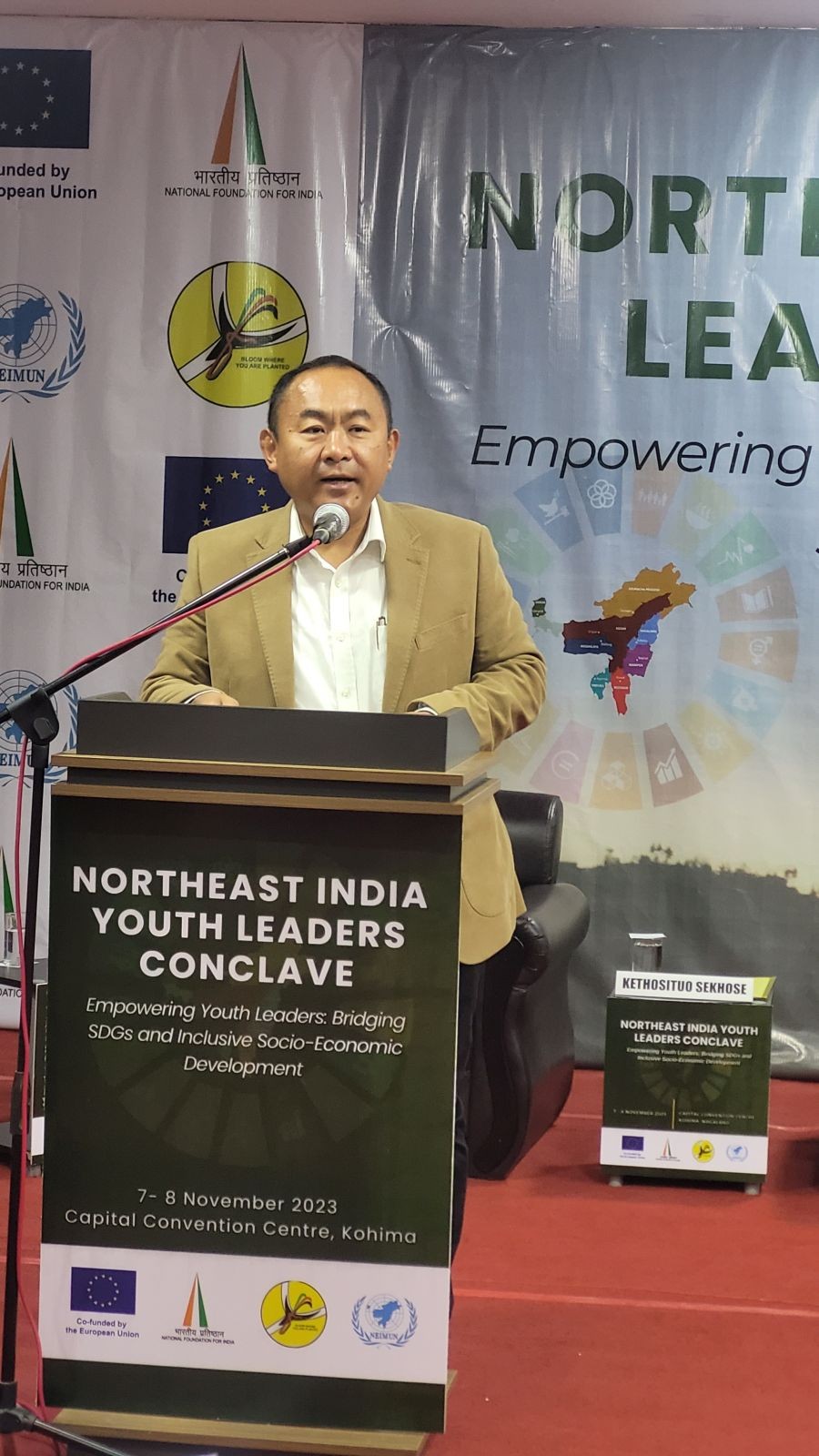Kethosituo Sekhose speaking at Northeast India Youth Leaders Conclave in Kohima on November 7. (Morung Photo)

Our Correspondent
Kohima | November 7
100 youth leaders from the North Eastern Region today converged at Capital Convention Centre, Kohima (Nagaland) for two-day long Northeast India Youth Leaders conclave under the theme “Empowering youth leaders- Bridging SDGs and inclusive socio-economic development.”
This conclave is organised by National Foundation for India (NFI) in collaboration with Department of youth resources and sports, Government of Nagaland and co-funded by European Union with NEIMUN as the knowledge and technical partner.
Addressing the opening plenary, Kethosituo Sekhose, Director Youth Resources & Sports, Nagaland said that the North East Region (NER) is perhaps one of the less developed regions of the country and faces many challenges; the important ones being poor infrastructure, particularly in the area of connectivity; remoteness; hilly and difficult terrain; high operational costs; lack of employment opportunities; subsistence farming; resource constraints, etc.
“On many critical parameters in the fields of health, education, infrastructure, etc, the states in the North East are below the national average. Not only is the North East less developed as compared to other states and union territories, but there are also wide interstate and intra-state disparities in terms of the level of development. However, the NER has immense potential for development,” said Sekhose.
He said that the problems of political violence, insurgency, ethnic conflict, migration pressure, inter-state disputes and underdevelopment have become integral to the understanding of the political process and economic development of the NER.
Economic factors appear to be the more potent reason for the continued political unrest and uncertainty in the entire region, he said.
“Vast areas remain inaccessible and backward even to this day. Together with the perpetuation of traditional practices, select and focused development impeded the efficacy of the process of modernization in the region. Moreover, the lack of infrastructure has been responsible for the sluggish growth of industries in the region despite abundance of natural resources and endless planning to modernize the economy. Development and modernization of the northeast has been the victim of a vicious circle,” he said.
He believed the lack of inclusive growth is the reason for this vicious cycle.
Inclusive development
Sekhose said that Inclusive growth, as defined by the Organisation for Economic Co-operation and Development (OECD), represents an equitable distribution of economic progress throughout society, ensuring that opportunities for advancement are accessible to all.
“This concept holds immense global importance today as it encompasses the fair sharing of economic benefits and opportunities across various sectors, fostering a resilient and broadly-based growth pattern. It is characterized by the promotion of productive employment opportunities for the entire workforce, the provision of equal access to markets and resources, and the protection of vulnerable populations. Inclusive growth plays a vital role in both sustaining economic development and preserving social harmony,” he said.
The significance of inclusive growth is underscored by the detrimental consequences of prolonged and pronounced inequality.
High levels of unemployment contribute to substantial economic costs, leading to skill atrophy, reduced employability, diminished savings for investment, and a decreased overall potential output, he said.
He said that divergent interests among various social groups and the political processes used to reconcile them can hinder growth, lead to unproductive government spending benefiting a select few, or incite discord and social unrest.
Both inequality and unemployment can erode individuals' capacity to manage economic risks, thereby increasing macroeconomic instability. Additionally, the more vulnerable segments of the labor market, such as young, low-skilled, and temporary workers, are particularly susceptible to economic shocks, making them prone to job insecurity, as we had seen during the COVID pandemic, he said.
Role of young leaders
Sekhose said that young leaders play a pivotal role in fostering inclusive development, contributing to the growth and prosperity of societies worldwide.
In an era marked by rapid societal changes and evolving global challenges, the energy, innovative thinking, and commitment of young leaders are essential for creating inclusive development that benefits all members of the community, he said, adding that young leaders play a multifaceted role in achieving inclusive development by examining their contributions, challenges they face, and the potential for lasting impact.
Moreover, young leaders serve as inspiring role models for their peers and younger generations. By actively engaging in community development projects, advocating for social justice, and taking leadership roles, they can motivate others to become proactive in their own communities. This ripple effect can lead to a groundswell of youth participation in inclusive development efforts.
He said that young leaders also bring a digital-savvy and interconnected perspective to the development landscape.
Stating that young leaders also face several challenges on their path to fostering inclusive development, he said despite these challenges, the potential for young leaders to create a lasting impact on inclusive development is undeniable.
“Their fresh perspectives, innovation, and ability to connect with diverse communities can lead to more equitable policies, better educational opportunities, and improved healthcare access,” he said.
He maintained that the role of young leaders in fostering inclusive development is indispensable.
He also told the Conclave that the State Government under the leadership of the Chief Minister today is firing from all its cylinders in nurturing and supporting young leaders through its Innovative Programmes to promote Inclusive Development.
“The results are already becoming visible politically, economically and socially,” he said.




